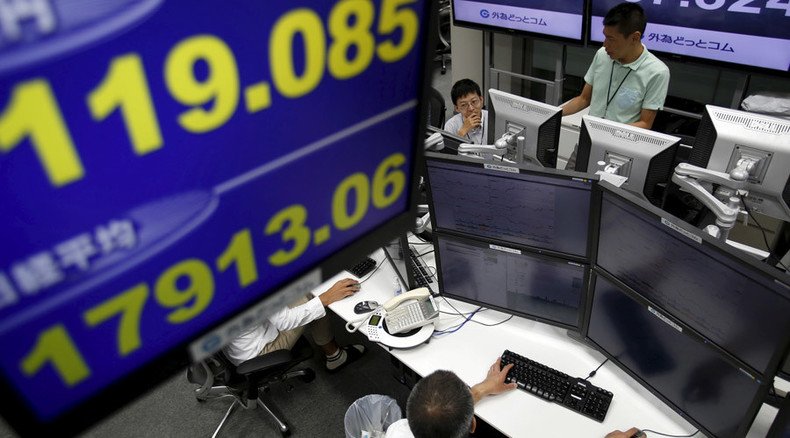Chinese stimulus fails to stabilize world markets as FTSE falls again

Early trading saw the FTSE 100 fall more than 100 points to below 6,000, knocking £30 billion from the UK’s top 100 companies. Tuesday trading had shown a glimmer of recovery following the Asian market crash on Monday.
The 10-day run of declines suffered by the FTSE abated briefly on Tuesday, after China’s central bank cut interest rates, but it fell again on Wednesday morning.
The FTSE fell by 4.6 percent on Monday morning, the worst session since the economic downturn in 2008.
The subsequent rise was followed in Wall Street as the Dow Jones rallied on Tuesday, but by the time trading closed, it had dropped again by 204.9 points.
British banks have biggest exposure to Chinese market instability http://t.co/oznaQJW3lkpic.twitter.com/edEZwQJAth
— RT UK (@RTUKnews) August 25, 2015Another turbulent Asian trading session again sent the FTSE spiraling down by more than 2 percent, or around 130 points.
“It’s Wall Street’s slump ahead of last night’s close that appears to be setting the pace for the UK market and as is often the way after these excessive moves, this volatility appears likely to be with us for some time yet,” Trustnet Direct market analyst Tony Cross said.
“As a result, London traders are once again staring at screens awash with red numbers.”
The slump comes after analysts noted that British banks are among the most exposed to the Chinese market.
‘Global economy has been in crisis since December of 2007’ - @PCraigRoberts on #BlackMondayhttps://t.co/TLDQ1TqaCi
— RT (@RT_com) August 26, 2015The rapid growth of the Chinese economy has seen a rise in the numbers of British banks acting as foreign lenders, resulting in a record total of $221.2 billion in outstanding loans to China, more than twice the total of US banks, which owe $86.5 billion.
UK banks were also the largest source of new loans to China during the year ending March 31, topping the list of 25 countries whose banks report their lending data.
The revelations came as the pound suffered its worst day of trading against the euro in six years.
After months of strong trading against the euro due to the Greek financial crisis, the pound fell by 2 percent, before regaining half a percent and finishing the day in a 1.5 percent drop.
Speaking during a visit to Finland this week, Chancellor George Osborne said Britain’s open economy made it vulnerable to economic tremors across the globe.
“Britain is a very open economy, we’re probably the most open of the world’s largest economies. And so we are affected by what happens; whether it’s problems in the eurozone [or] problems in Asian financial markets,” he said.
“Everyone’s concerned about the situation in Asian financial markets,” Osborne said. “I would take it as a reminder that we are not immune from what happens in the world. It’s all the more reason why countries like Britain and indeed Finland need to get their own house in order.”












